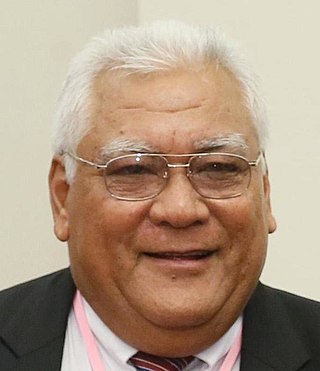Related Research Articles
The politics of Tuvalu takes place in a framework of a parliamentary representative democratic monarchy, whereby the monarch is the head of state, represented by the governor-general, while the prime minister is the head of government. Executive power is exercised by the government.

Maatia Toafa OBE is a Tuvaluan politician, representing Nanumea, who served two non-consecutive terms as Prime Minister of Tuvalu. He first served as prime minister, and foreign minister, from 2004 to 2006, from the resignation of his predecessor, Saufatu Sopoanga, until the defeat of his Cabinet in the 2006 general election. From 2004 to 2006 he also held the role of foreign minister.
Tuvalu elects a legislature on a national level. The Parliament of Tuvalu has 16 members, elected for a four-year term in 8 double-seat constituencies. Tuvalu is a de facto non-partisan democracy since it does not have political parties. The political system is based on personal alliances and loyalties derived from clan and family connections. It does tend to have both a distinct government and a distinct opposition. The 16 members of the current parliament are elected from eight two-seat constituencies via plurality block voting.

The Parliament of Tuvalu is the unicameral national legislature of Tuvalu. The place at which the parliament sits is called the Vaiaku maneapa. The maneapa on each island is an open meeting place where the chiefs and elders deliberate and make decisions.

Sir Kamuta Latasi is a political figure from the Pacific nation of Tuvalu from Funafuti atoll. He was elected to the Parliament of Tuvalu in 1992. Latasi served as the 4th prime minister, and foreign minister, from 1993 until 1996. He has served as the Speaker of parliament from 2006 to September 2010 and again from December 2010 to March 2014.

Apisai Ielemia was a Tuvaluan politician. He served as the tenth Prime Minister of Tuvalu from 2006 to 2010, and also held the role as Foreign Minister. He was returned as a member of parliament in the 2010 Tuvaluan general election. He was re-elected to parliament in the 2015 Tuvaluan general election. On 5 October 2016 Chief Justice Sweeney of the High Court of Tuvalu declared that Ielemia’s parliamentary seat was vacant as he was not qualified to be a member of parliament, as the consequence of the short time the opposition MP served time in jail following his conviction on 6 May 2016 in the Magistrate’s Court of charges of abuse of office during the final year of his term as prime minister. The abuse of office charges related to payments deposited into a National Bank of Tuvalu personal account. The 5 October 2016 decision of the Chief Justice was controversial as it appeared to contradict the June 2016 decision of Justice Norman Franzi of the High Court of Tuvalu that had quashed Ielemia’s conviction and acquitted him of the abuse of office charges. The appeal to the High Court held that the conviction was "manifestly unsafe," with the court quashing the 12-month jail term.

Willy Telavi is a Tuvaluan politician who was Prime Minister of Tuvalu from 2010 to 2013.
Taukelina Finikaso is a political figure from the Pacific nation of Tuvalu. At the 2006 general election, he was elected MP for his home constituency of Vaitupu. He was educated in Kiribati and Fiji before acquiring a Law Degree at the University of Tasmania and a master's degree in International Law from Sydney University. Finikaso was admitted on 16 October 1987 to the Supreme Court of the Australian Capital Territory. Prior to entering into politics, Finikaso worked as a lawyer and then as a Permanent Secretary under the different ministries of the Government. Finikaso has been a Member of Parliament for the Constituency of Vaitupu from 2006 to 2019. He was not re-elected in the 2019 general election.
Parliamentary elections were held in Tuvalu on 16 September 2010. Voters elected fifteen members of the Parliament to a four-year term. All candidates were independents, as there are no political parties in the country. Ten out of the fifteen incumbent members were re-elected. The remaining five incumbents, including Deputy Prime Minister Tavau Teii, did not retain their seats. The incumbent Prime Minister, Apisai Ielemia, retained his seat in Vaitupu constituency. On 29 September, Maatia Toafa from Nanumea won eight of the fifteen votes to become Prime Minister.

Enele Sosene Sopoaga PC is a Tuvaluan diplomat and politician who was Prime Minister of Tuvalu from 2013 to 2019.
The Cabinet of Tuvalu is the executive branch of the government of Tuvalu.
Namoliki Sualiki Neemia, &, generally referred to as Namoliki Sualiki, is a Tuvaluan politician.

Monise Laafai is a Tuvaluan politician and businessman.
Fauoa Maani MBE is a Tuvaluan politician.
Vete Sakaio OBE is a Tuvaluan politician.
Isaia Italeli Taeia, more commonly known as Isaia Italeli, was a Tuvaluan politician.
Elisala Pita OBE was a Tuvaluan politician.

The Telavi Ministry was the 13th ministry of the Government of Tuvalu, led by Prime Minister Willy Telavi. It succeeded the Second Toafa Ministry upon its swearing in by Governor-General Iakoba Italeli on 24 December 2010 after a vote of no confidence in former Prime Minister Maatia Toafa. Following Telavi's removal as prime minister, his ministry was subsequently brought down by the opposition's vote of no confidence and was succeeded by the Sopoaga Ministry, led by Enele Sopoaga, on 5 August 2013.
The Second Toafa Ministry was the 12th ministry of the Government of Tuvalu, led by Prime Minister Maatia Toafa.
A by-election was held in the Nanumea constituency in Tuvalu on 19 September 2014. It followed the resignation of the incumbent, Willy Telavi, in August.
References
- 1 2 Hassall, Graham (2006). "The Tuvalu General Election 2006". Democracy and Elections project, Governance Program, University of the South Pacific. Retrieved 11 April 2015.
- 1 2 "Palamene o Tuvalu (Parliament of Tuvalu)". Inter-Parliamentary Union. 2010. Retrieved 7 March 2013.
- ↑ "Willie Telavi the new prime minister in Tuvalu". Radio New Zealand International . 24 December 2010. Retrieved 19 September 2011.
- ↑ Cooney, Campbell (1 August 2013). "Tuvalu government faces constitutional crisis". Australia News Network. Retrieved 5 August 2013.
- ↑ Cooney, Campbell (5 August 2013). "Tuvalu Sopoaga elected new PM in Tuvalu". Radio Australia. Retrieved 5 August 2013.
- ↑ "Tuvalu by-election sees former speaker win seat". Radio New Zealand. 16 January 2014. Retrieved 16 January 2014.
- ↑ "New MP elected in Tuvalu". FENEUI NEWS/PACNEWS. 22 September 2014. Retrieved 19 October 2014.
- ↑ "Tuvalu PM to remain in power", ABC Radio Australia (audio), 25 August 2011
- ↑ "New MP elected in Tuvalu". Islands Business from Radio Tuvalu. 11 September 2013. Archived from the original on 5 April 2014. Retrieved 11 September 2013.
- ↑ "Tuvalu’s Opposition waiting to hear from GG" Archived 2014-01-08 at the Wayback Machine , Islands Business , 1 July 2013